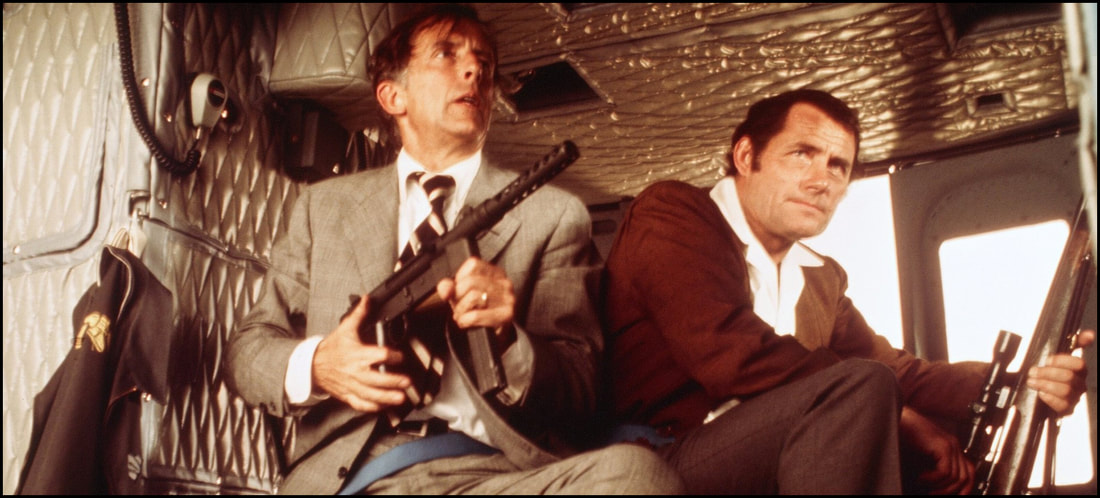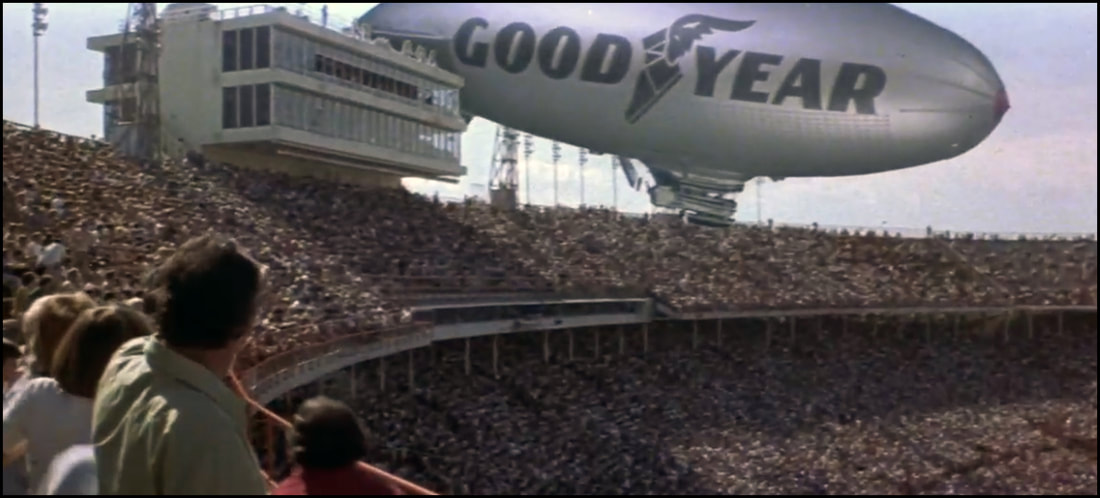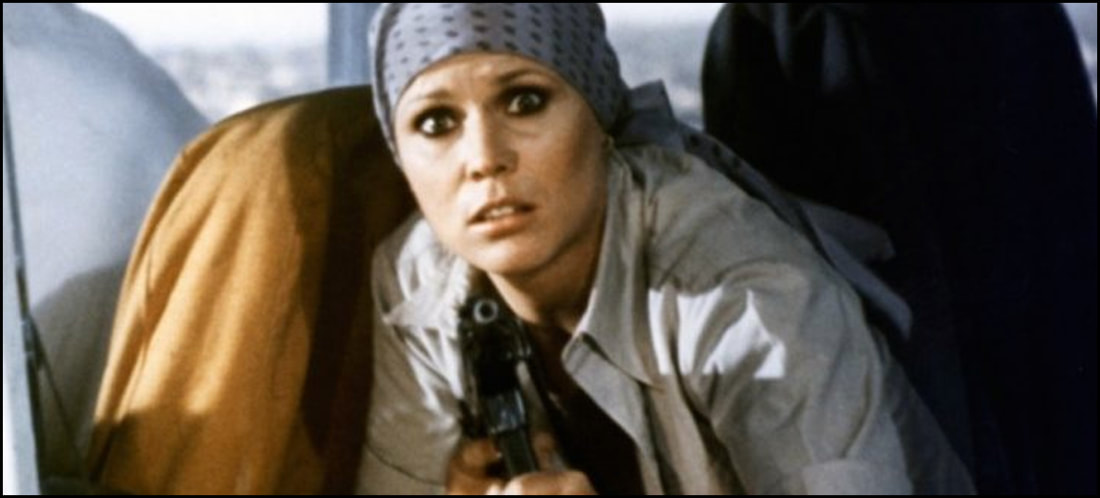So it was certainly understandable why Thomas Harris’ 1975 debut novel Black Sunday turned some heads. Depicting a full-blown terrorist attack on the stadium hosting the Superbowl – that great American celebration of all things football – brought the scope of international terrorism to the West’s biggest doorstep, a place where television cameras would already be rolling to capture each and every moment of the big game. It goes without saying that Hollywood knew a good thing when they saw it (or read it, I should say), so the rights were purchased by the Robert Evans Company, and a screenplay was commissioned. Renowned director John Frankenheimer was inevitably attached, and an international cast was round up to give the work the required authenticity.
Despite having an awful lot of positive attributes going for it, Black Sunday was not the blockbuster all involved probably thought it would be. Wikipedia.org reports that it grossed just under $16 million on a budget of $8 million, and that’s not quite the kind of return producers likely anticipated. In the postmortem of its lackluster performance, a number of causes – including a like-minded thriller being released only months earlier – could be said to have kept it from achieving box office glory … but I’m inclined to think that perhaps the American ticket-buying public wasn’t really ready to face the prospects of so many innocent civilians being placed in so deadly a predicament.
(NOTE: The following review will contain minor spoilers necessary solely for the discussion of plot and/or characters. If you’re the type of reader who prefers a review entirely spoiler-free, then I’d encourage you to skip down to the last few paragraphs for the final assessment. If, however, you’re accepting of a few modest hints at ‘things to come,’ then read on …)
From the film’s IMDB.com page citation:
“Black Sunday is the powerful story of a Black September terrorist group attempting to blow up a Goodyear blimp hovering over the Super Bowl stadium with 80,000 people and the President of the United States in attendance.”
In them, there’s always a somewhat knighted main character – a private eye, a police detective, some professional errand runner – whose willing to both match wits and muscles with characters often twice his size. Why? Well, some would say that it’s because this main player coddles a secret death wish, but I’ve always argued that it’s only because our hero understands full well that the only way to vanquish his or her foes is to match the level of ruthlessness the villains bring to each and every equation. If he doesn’t – if he shows any signs of weakness or misgivings – then he only opens the door to more bloodshed, setting in motion yet one more campaign of suffering to scar his already guilty conscience.
In that regard, a case could be made that it’s Major David Kabakov (played by Robert Shaw) who sets in motion this series of events depicted in against the backdrop of Black Sunday. In the opening vignette when he and his Israeli commandos are quietly taking out the Palestinian terrorist group known as Black September, Kabakov breaks open a bathroom door only to come across a woman cowering against the back wall. She’s frightened and defenseless. In that moment, the major takes pity on her; when orders were to shoot to kill everyone on the premises, he opts to let her be … and this is the mistake that just might haunt him more than any bloody assassination he’s ever committed.
The lady wasn’t some terrorist’s lover. She is Dahlia Iyad (Marthe Keller), the group’s mastermind. And she’s now committed – more than ever – to inflict maximum damage on the United States and its global allies.
This is exactly the kind of premise hard-boiled prose relies on, and Black Sunday works efficiently within this territory. The bulk of the movie is a tense cat-and-mouse chase between Kabakov and Iyad, all of it playing out like a visual chess match wherein the stakes are the lives of countless thousands. Much of Iyad’s success is owed to the fact that she’s actually well on the way toward orchestrating an incredible attack already: as a ‘honey pot,’ she’s brainwashed Michael Lander (Bruce Dern) – a veteran POW of the Vietnam War returning home in disgrace – into aiding and abetting her plot to deliver carnage at the American Superbowl. As one of the few pilots assigned to the Goodyear Blimp – the famed aircraft that hovers relentless over the big game – he grants her the level of access required to deliver on her dark crusade.
At nearly two-and-one-half hours, Black Sunday is a meaty picture, and it’s an experience not to be trifled with. While I’ve read some suggestion that the film is too long to effectively deliver on its payoff, I’d disagree mostly because Sunday requires a modicum of set-up in order to be functionally believable. The security for such a public event as the Superbowl is astoundingly complex already, and the fact that the President of the United States decides to be in attendance at the affair only raised the bar considerably higher. The plot as conceived and translated from the Harris novel requires more than a small amount of finagling. Also, given the fact that Iyad is being actively pursued by Kabakov and his American counterparts all while she’s trying to achieve an unimaginable attack also grants the story some added dimension that can’t simply unfold quickly. This story takes time, so kudos to Frankenheimer and his talented cast and crew for achieving what they did.
Also, I’d be remiss if I failed to point out that the great American football game – the Superbowl – truly becomes one of the film’s big stars. (Like Shaw, even football is bigger than life!) The fact that Frankenheimer was able to capture live footage of Superbowl X between the Pittsburgh Steelers and the Dallas Cowboys with his stars in attendance on the sidelines and throughout the stadium gives Black Sunday an unquestioned realism, especially for its big impending showdown between the forces of good and evil. While the ultimate act of terror is brought to the screen via some rather obvious (and dated) special effects trickery, it’s very clear that no holds were barred in delivering this theatrical spectacle as best they could at the time.
Black Sunday (1977) was produced by the Robert Evans Company. DVD distribution (for this particular release) is being coordinated by the folks at Arrow Films. As for the technical specifications? While I’m no trained video expert, I found the sights and sounds to be – for the most part – exceptionally good: there are a few sequences with some obviously dated special effects work in the big finish, and it’d be a crime if I didn’t point out that they were a bit limited. Lastly, if you’re looking for special effects, then you do have a bit to get excited about. I was provided a proof copy from the distributor, so I can’t speak to any of the advertised packaging materials (artwork, essay, etc.), but there’s a solid audio commentary from film producer Josh Nelson, a visual essay discussing the merits of the feature, and a documentary exploring the career of Frankenheimer. It’s an impressive assortment, though I did find the commentary a bit slow in spots.
Highly recommended.
Black Sunday feels like the kind of theatrical experience that began life as a best-selling novel, an experience so big that – naturally – Hollywood wanted to adapt it on film. Alas, the shortcomings of the whole book-to-film process occasionally rear their ugly head (not all characters get fleshed out the way they usually do in the novel; the effects work of the era might not exactly have been seamlessly up to the task of bringing it all to convincing glory; etc.), but the flick rather deftly incorporates headline-making events into a compelling yarn for audiences to enjoy again and again. I thought Shaw’s work was good – a bit too reserved in a few spots – but Dern was the obvious choice as he’d done this kind of thing several times before already.
In the interests of fairness, I’m pleased to disclose that the fine folks at Arrow Films provided me with a complimentary copy of Black Sunday (1977) by request for the expressed purposes of completing this review; and their contribution to me in no way, shape, or form influenced my opinion of it.
-- EZ




 RSS Feed
RSS Feed